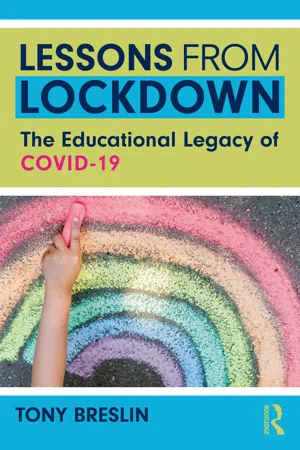
Lessons from Lockdown
The Educational Legacy of COVID-19
Tony Breslin
- 214 pagine
- English
- ePUB (disponibile sull'app)
- Disponibile su iOS e Android
Lessons from Lockdown
The Educational Legacy of COVID-19
Tony Breslin
Informazioni sul libro
Lessons from Lockdown explores the impact of COVID-19 on our schooling systems, on the young people and families that they serve and on all who work in – and with – our schools, and asks what the long-term ramifications of the pandemic might be for the pedagogy and purpose of formal education. Drawing on the voices of more than a hundred pupils, parents and professionals, it reveals how teachers and learners are adapting practice in areas such as curriculum modelling, parental engagement, assessment and evaluation and blended and online learning.
In this timely new book, Tony Breslin draws on his experience as a teacher, researcher, examiner, school governor and policy influencer to assess what the educational legacy of COVID-19 could be, and the potential that it offers for reframing how we 'do' schooling.
Whatever your place in this landscape, Lessons from Lockdown is a must-read for all concerned about the shape and purpose of schooling systems in mature economies – schooling systems and economies set on recovering from the kind of 'system shock' that the pandemic has delivered.
Domande frequenti
Informazioni
1
Schools during lockdown
We’ve been in a fortunate position where my wife was previously a (primary school) teacher and she’s taken it upon herself to teach our younger two (primary age) children. She’s put aside the work that’s been emailed to us (by the school) and come up with her own schemes of work. She’s staying up late, preparing what’s going to be done for the rest of the week … and she’s enjoyed it. The children have enjoyed it to the point, actually, where we’re discussing what we’re going to do in September. And should we actually continue home-schooling? Or should we send the younger two back?(Parent and education professional, focus group – secondary education, 15 July 2020)
Some parents wanted to be excited about helping their children with virtual learning, but were challenged to do so as they were working in demanding full-time jobs (albeit from home). Whilst there was understanding for virtual meetings interrupted by children, in the end, many parents felt that it was difficult to be everything: parent, worker and teacher, especially in instances where the parent is stale in their knowledge or unfamiliar with the subject – or the technology.(Parent, written submission, 31 August 2020)
Early experiences of lockdown



He [the head teacher] called me in and said, ‘Diane, I’ve got to tell you something, I need to send you home!’ Well, I said the most bad swear word, the worst ever swear word, that I’ve ever said in his office! Because I’m on that, you know, I’m on the, the list, the vulnerable group, the listed flu jab people. And I was absolutely furious. There were three other senior managers who he had to have that same conversation with, and we all picked up our belongings and our Surface Pro and we schlepped out of the school. For me, those initial days, knowing that closure was coming very shortly – well, I felt really, I didn’t want to be feeling as useless as I was feeling; ’cause I felt that you feel a bit of a sense of responsibility, you know.(Diane Rawlins, senior deputy, Arbury Primary School, Cambridge, focus group – primary education, 14 July 2020)
There were just lots of different emotions that we went through in those early days. I was answering emails at the speed of light. I was juggling everything all at once. I was anxious that what if somebody needed me? Normally they’d just drop into my office and, of course, that couldn’t happen anymore. So, I needed people to know that I was there for them. I might not be in the building. But it was really quite strange for me.
With the situation changing so rapidly, the announcement on Wednesday 18 March that schools would be closing and our examinations cancelled came as a shock: although exams are far from a pleasant experience, I did not experience relief in response to the news. Rather, I feared for the future, for what would become of my university offer for the following academic year; I grieved the loss of the final months at my sixth form, and I struggled through the hasty goodbyes. I recall one of my closest friends and I agreeing that ‘it wasn’t supposed to end like this’.(Amy, Year 13 student, Hertfordshire, written submission, 27 August 2020)
My phone is synched to the school calendar and it pings daily with alerts for all of [the] things that aren’t now happening … parents’ evenings, performances, transition meetings – these are the things that make the school what it is.(Nick Johnson, chief executive, BERA, research interview, 13 August 2020)
Scaling-up schooling
Indice dei contenuti
- Cover
- Endorsements
- Half Title
- Title Page
- Copyright Page
- Dedication
- Contents
- List of figures
- Preface
- Acknowledgements
- About the author
- About the researcher
- 1 Schools during lockdown
- 2 Parental engagement and the experience of learning at home
- 3 Economics, education and inequalities
- 4 Breadth, balance, the curriculum and its assessment
- 5 Making the grade: The class of 2020
- 6 Catching up on ‘lost’ learning
- 7 Pupil well-being and emotional recovery
- 8 Leadership and governance
- 9 Inspection, research and system performance
- 10 Recasting the learning blend: Technology and pedagogy
- Next steps
- Appendix A: research methodology
- Appendix B: research participants
- Appendix C: recommendations
- References
- Index